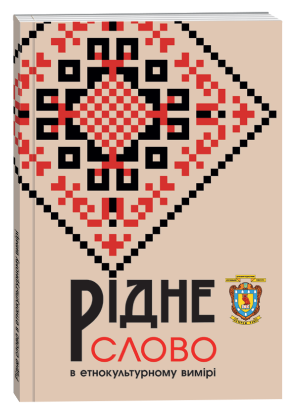MENTAL-AXIOLOGICAL UNIVERSALITY OF THE IMAGE OF MOTHER IN LANGUAGE CREATION OF POETS OF THE SIXTIES
DOI:
https://doi.org/10.24919/2518-1602.2023.17Keywords:
language image, linguistic phenomenon, symbol, concept, linguopoetics, language thinking, associate, language creation, mother-centrism, language awareness, semeAbstract
The article focuses on the intricate linguistic and stylistic interpretation of the image of mother in language creation of famous Ukrainian poets of the sixties Ivan Drach, Lina Kostenko and Mykola Vinhranovskyi. The authors note that the inner form of a symbolic and axiologically significant wordimage implies mental profundities, traces receptive stereotypes, forms an individual associative space that does not always correlate with the folk song and traditional poetic mother-centrism of Shevchenko or Malyshko, although Kobzar’s verified linguistic triad (mother-woman, mother-Ukraine, Mother of God – Mary, the Virgin, Madonna), which universally represents one of the crucial segments of the national poetic picture of the world, is observed quite clearly. The article tracks down the way philosophical aspects are actualized in the researched contexts (the immanence of maternal love and sacrifice, the inevitability of separation, pain, emotional turmoil, the inevitability of loss). Planetarian nature, timelessness, extra-dimensionality are intrinsic attributes of the linguistic thinking of I. Drach, Lina Kostenko, M. Vinhranovskyi. It is postulated that the authors’ innovativeness lies in their ability to convincingly and appealingly combine mental (from the depths of people’s worldview) and philosophical axiological foundations in presenting an image that is sensitive for national language awareness, and highlight its receptive universalism. It is emphasized that in most of Drach’s texts, the word-image mother appears in common everyday situations. Her linguistic portrait is not stylized in a folk song or traditional poetic manner; it is natural, explicit, touching in its commonness. In “Chornobyl Madonna” and “Madonna of Crossroads” drama interacts with sacredness. The sanctity of motherhood, her nation protection mission permeates other contexts as well (in Lina Kostenko’s poems of the Great War period). It is generalized that the mental-axiological linguistic phenomenon of the image of mother is the most universally embodied in the language creation of the researched poets of the sixties.
References
Вінграновський, М.С. (2004). Вибрані твори: у 3 т. Т. 1: поезії. Тернопіль: Богдан. 400 с.
Дзюба, І. (2016). Гармонія крізь тугу дисонансів. Київ: Либідь. 584 с.
Дзюба, І. (1986). Передмова. М. Вінграновський. Вибрані твори. Київ: Дніпро. 5–15.
Дзюба, І. (2007). Народжуй себе допоки світу. Передмова. Іван Драч. Берло: книга поезій. Київ: Грамота. 5–26.
Драч, І. (2007). Берло: книга поезій. Київ: Грамота. 912 с.
Жайворонок, В.В. (2006). Знаки української етнокультури: словник-довідник. Київ: НАН України, Інститут мовознавства ім. О. Потебні. 703 с.
Енциклопедичний словник символів культури України (2015) / За заг. ред. В.П. Коцура, О.І. Потапенка, В.В. Куйбіди. Корсунь-Шевченківський: ФОП Гавришенко В.М. 912 с.
Єрмоленко, С. (2010). Висока естетика поетичного слова Ліни Костенко. Культура слова, 73, 6–15. Київ: Видавничий дім Дмитра Бураго.
Єрмоленко, С.Я. (2011). Весь у слові, як у сповиткові. Культура слова, 74, 6–13.
Ільницький, М. (1988). Чорнобильська мадонна. Літературна Україна, 8. Київ.
Клочек, Г.Д. (1987). Аналіз одного вірша. Мати сіяла сон Б. Олійника. Радянське літературознавство, 3, 37–42.
Костенко, Л. (1989). Вибране. Київ: Дніпро. 559 с.
Костенко, Л. (1998). Маруся Чурай. Поезії. Київ: Наукова думка. 7–147.
Костенко, Л. (1999). Берестечко: історичний роман. Київ: Український письменник. 157 с.
Костенко, Л. (2011). Мадонна Перехресть. Київ: Либідь. 112 с.
Костенко, Л. (2011). Річка Геракліта. Київ: Либідь. 288 с.
Культура української мови (1990): довідник / за ред. В.М. Русанівського. Київ: Либідь. 334 с.
Лещенко, Т.О. (1983). Стоїть на видноколі світла мати. Інтимна лірика Б. Олійника на уроці позакласного читання. Українська мова і література в школі, 25–32.
Марфіна, Ж. (2011). Я все віддам за одне недоспіване «мамо» (міфопоетика слова-образу мати у поезії Б. Олійника). Культура слова, 74, 22–27.
Маленко, О.О. (2010). Мовно-естетична інтерпретація буття в українській поетичній мовотворчості (від фольклору до постмодерну). Харків. 488 с.
Масенко, Л.Т. (1987). Слово в поезії Івана Драча. Українська мова і література в школі, 1, 32–33.
Мацько, Л. (2013). Мовна особистість А. Малишка як культурологічний феномен. Культура слова, 78, 7–11.
Мех, Н. (2013). Пісня, що народ заколисала (образ пісні в поетичній мові А. Малишка. Культура слова, 78, 22–25.
Симоненко, В. (2011). Зажинок. Черкаси: Брама-Україна. 536 с.
Ставицька, Л. (1990). Серцем вистраждане слово. Мовознавство, 6, 23–32.
Стецик, М.С., Тяжкун, Т.Ю., Стецик, А.В. (2022). Матерецентризм поетичного мовомислення Андрія Малишка та Бориса Олійника. Науковий вісник ДДПУ імені І. Франка. Серія: Філологічні науки (мовознавство), 8, 78–82.
Тарнашинська, Л. (2010). Художній час як категорія індивідуального «Я». Українське шістдесятництво: профілі на тлі покоління: історико-літературний та поетикальний аспекти. Київ: Смолоскип. 632 с.

